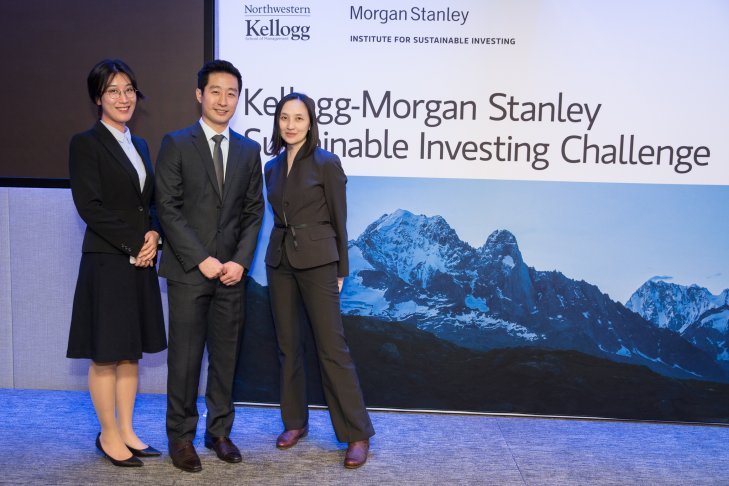
How do you attract a critical mass of private capital to solve the most pressing global issues of today? This was the problem put to graduate teams at the 8th Kellogg – Morgan Stanley Sustainable Investing Challenge, held at Morgan Stanley’s European headquarters in London on 13 April 2018.
For winning team Koponan Haiyan, comprising Maoying He, Teng Kai Loh and Felicia Shaw from Singapore Management University (SMU)’s Master of Business Administration (MBA) programme, the answer proposed was an “ASEAN Storm Resilience Fund” aimed at helping farming communities withstand extreme weather events. The Fund’s concept combines grassroots-led microfinancing with a development impact bond enhancement feature, and facilitates investment in storm-resistant housing.
The 2018 edition of the Challenge was considered one of the most competitive in its eight-year history. A total of 307 students from 65 schools submitted investment prospectuses targeting solutions in 34 countries. 12 teams were shortlisted for the finals in London, with participants from Harvard, MIT, Stanford, Darden, Columbia, LSE, Oxford, Tuck, Utah, CEIBS, the Indian Institute of Management and Business School Netherlands.
After one round of presentations, judges narrowed the field to four top teams, who made their pitch to Morgan Stanley senior executives and distinguished institutional investors before results were announced.
As the very first team to represent SMU at the Challenge, Koponan Haiyan was very much the dark horse in the race. However the team was undaunted. “There was pressure but it didn’t affect us. Ultimately we believed in the strength of our proposal, which is highly viable and scalable,” summed up Maoying. “There is an urgent need for financing solutions in this space.”
One of the judges, Ian Simm, Founder and Chief Executive of Impax Asset Management, explained Koponan Haiyan’s winning formula: “We chose ASEAN Storm Resilience Fund because we found their proposal to be especially clear. They have created an approach to solving a very serious problem in a way that we believe can flex with changing conditions and is set up for success.”
As part of their prize, Koponan Haiyan will be travelling to Los Angeles at the end of April to present their ideas at the prestigious Milken Institute Global Conference. “The Milken Institute attracts the world’s luminaries in finance, innovation and policy. This will be a valuable opportunity to learn from the best,” said Teng Kai. “We’re proud to be representing SMU and Southeast Asia at the event.”

The teams are now exploring how to take the ASEAN Storm Resilience Fund forward, and are keen to make an impact for SMU and the region, regardless of the form it takes. “Every team’s proposal in the competition, no matter what the specific solution, was really about provoking change for the better,” said Felicia. “That really inspires us.”
Koponan Haiyan thanks mentors Dr Ser-Keng Ang, Academic Director, SMU Master of Business Administration and Dr Jack Hong, Adjunct Faculty member at SMU Lee Kong Chian School of Business.
About the Kellogg – Morgan Stanley Sustainable Investing Challenge
Every year, the Kellogg School of Management and Morgan Stanley partner to host the challenge where teams of graduate students from around the globe develop and pitch creative financial approaches to tackle the world’s most pressing challenges.
Contestants must propose and defend a strategy that uses finance and investment tools rather than an operating enterprise to address an environmental or societal challenge. The competition is an opportunity to apply core finance principles to target the economic, social and environmental challenges that drive the field of sustainable investing. Pitches might focus on areas like water, energy, food, social mobility, climate change, education or healthcare, among others. Contestants are encouraged to apply the entire spectrum of investment tools, styles and asset classes.
The Challenge seeks to identify the next generation of sustainable finance practitioners, connect emerging leaders with industry professionals, and foster even greater emphasis on sustainability at graduate schools around the world.